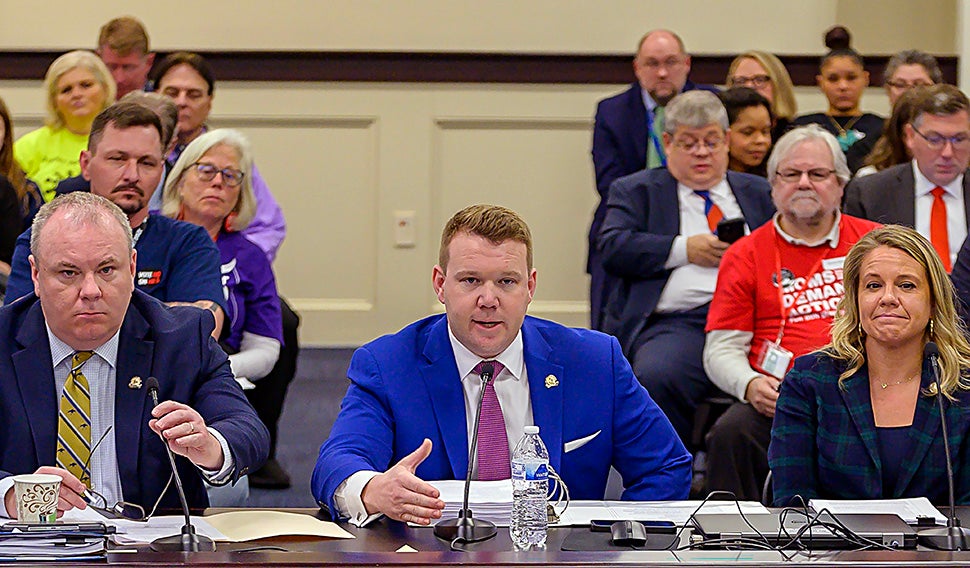Safer Kentucky Act heads to governor
Published 3:08 pm Thursday, March 28, 2024

- FRANKFORT, March 14 – Rep. Jared Bauman, R-Louisville, (center) presents House Bill 5, an act related to crimes and punishments, with House Majority Whip Jason Nemes, R-Middletown, and Rep. Emily Callaway, R-Louisville, during Thursday’s Senate Judiciary Committee meeting.(LRC Public Information)
FRANKFORT — The Safer Kentucky Act, Louisville Republican Rep. Jared Bauman’s extensive crime bill, passed 75-23 Thursday.
It now heads to Gov. Andy Beshear, who has ten days to either sign it, veto it or do nothing and allow it to pass without his signature.
Rep. Ashley Tackett Laferty was the sole Democratic yes vote, while Republican Reps. Steven Doan, Courtney Gilbert, Savannah Maddox and Felicia Rabourn voted no.
Review of the Safer Kentucky Act
The 78-page bill has dozens of provisions enhancing criminal penalties and establishing new crimes.
One is a three strikes law requiring life in prison or the death penalty for anyone who commits three, separate violent felonies. Kentucky already has a persistent felony offender statute, but this is specific to violent offenses.
The Safer Kentucky Act bans street camping on public streets, areas under bridges or underpasses, in front of businesses, on private property, in parks or other areas designated for use by pedestrians or vehicles. After a first warning, violations would be a Class B misdemeanor.
It also prohibits the use of state funds for initiatives that provide permanent housing to people experiencing homelessness, unless they include certain behavioral and rehabilitative requirements.
These would have to, at a minimum, “facilitate appropriate treatment of any mental health conditions or substance use disorders and prohibit criminal activity.”
HB5 adds several crimes to the violent offenders list, including attempted murder, wanton endangerment with discharge of a gun, violent carjacking, first degree arson and second degree robbery.
It would allow business owners and employees to use “reasonable force” to prevent suspected shoplifting.
Several fentanyl provisions are included. Under one, anyone who knowingly sells fentanyl causing a fatal overdose would be charged with murder. If no money is exchanged, it would be manslaughter.
The penalty for smuggling fentanyl contraband into jails also increased to a Class B felony.
Cost
While there is no official fiscal impact statement and the total cost is unknown, an analysis by the Kentucky Center for Economic Policy found that additions to the violent offender statute alone would cost about $878 million in the next decade in the form of lengthier mandatory sentences.
Democrats objected to the cost Thursday.
According to a corrections impact statement, Class A and B felons cost the state at least $853,589, nearly double the cost of a Class C felon and over ten times the cost of a Class D felon.
Aging offenders who need medical services cost about $30 more per day than the average offender.
Rep. Nima Kulkarni, D-Louisville, asked the House what that money could do if it were invested into diversion, rehabilitation and reentry efforts.
“Can we afford this bill?” she asked. “We do not have the capacity, we do not have the people. And then we will be housing offenders for longer periods of time, and they age.”
Would the Safer Kentucky Act work?
After violent crime spiked during the pandemic, it has begun to return to normal levels across the country and in Kentucky.
According to the FBI, Kentucky’s violent crime rate was 5% lower in 2022 than a decade before, and was 44% lower than the national average in 2022.
Louisville Democratic Rep. Josie Raymond, who has dubbed HB5 the “Suffer Kentucky Act,” said that it is a not a response to an increase in crime, but rather an increase in “manufactured fear.”
“This bill, rather than acknowledge the difficult work required to actually make Kentucky safer, has one solution to a whole host of societal problems,” Raymond said. “And that’s increase penalties, lock them up.”
According to a 2024 Kentucky Department of Corrections jail report, 69% of Kentucky’s full service jails are over capacity.
Rep. Rachel Roberts, D-Newport, said the bill does nothing to provide more safe, attainable housing, food security, accessible childcare, family support or any number of measures that would address systemic issues impacting crime rates.
“This bill doesn’t make Kentucky safer,” she said. “Instead, it limits the off ramps for those who have strayed to return into the fold, to be able to return as lawfully contributing citizens.”
Limited debate, Republican support
After about an hour of debate, mostly Democratic opposition, a Republican filed a motion to limit debate. It passed, and each side was limited to 15 additional minutes to talk about the bill.
Bauman said the bill does not criminalize homelessness. Democrats disagreed.
Rep. Jason Nemes, R-Middletown, was met with applause after expressing his support for the bill.
Kentucky has more treatment beds per capita than any other state, he said.
While the Republican Party believes in restorative justice “for those who could get back to our communities and get back to their families,” Nemes said they also believe in protecting Kentuckians from criminals.
He particularly objected to the Democrats’ complaints about the three strikes provision, which they’ve called ineffective and redundant.
“How many times can you burn down a house?” Nemes asked. “How many people do you get to rape? How many people do you get to assault with deadly weapons? How many people do you get to kill before we put you away forever?”





